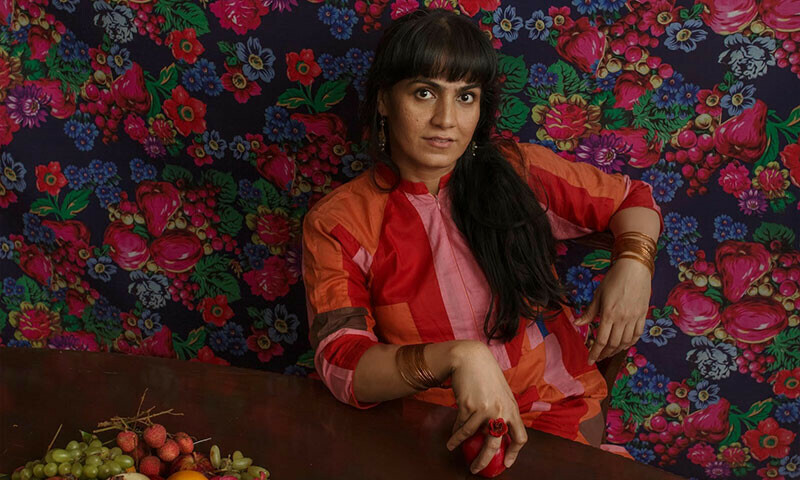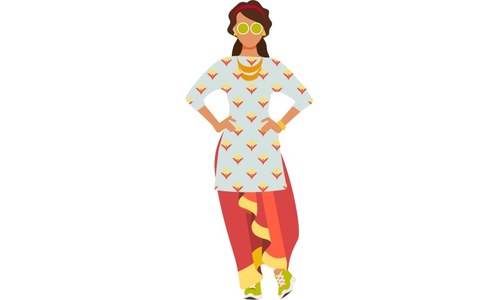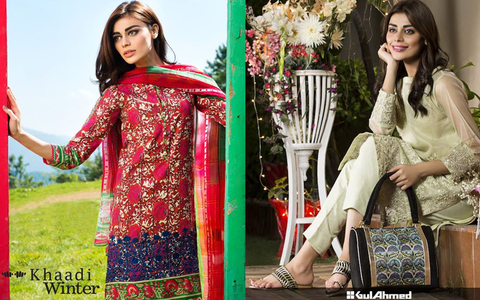Celebrating the Authentic Pakistani Woman
If there is one thing that defines Khadija Rahman, Director, Generation, it is that she carves out her own path. Wearing a white embroidered kurta, she sits calm and serene, almost as if waiting to be asked questions to which she has had answers for a long time. Generation was set up in 1983 by her parents Nosheen and Saad Rahman but she is quick to point out that she wasn’t exactly raring to take over – it was quite the opposite.
Rejecting societal pressure to join the family business, she carved her own identity and silenced nagging voices when she pursued design at university. But much like the collections she churns out, the message of modernity highlighted with a desi flavour, behind her independent streak lay a sense of duty that caused her to join the business.
“I had no interest in fashion. As it was the family business and thinking I had a strong interest in design and community, I thought it would be wise to become a part of it.”
Upon joining as a designer, Rahman immediately made her mark. She created a collection that stood apart from the usual, embellished, couture seen on the ramp.
“A Dot That Went For a Walk was my first collection after graduation. I had just had my first child and as I needed to bring him into work with me, I was finally given my own office. The collection was experimental and featured many items which were strappy and sheer, layered with bralets underneath. It was surprisingly very well received by the public.”
The entire collection sold out almost immediately. Generation had a new person at the helm.
But she hasn’t just carried the legacy of Generation as a high street brand forward. Her unique success comes down to her ability to use her own experiences to capture and effectively communicate via her prêt designs and consequential campaigns. She has gone beyond the realm of what is accepted in society and what is not. Featuring ‘everyday’ women in her campaigns would be settling and that is not what Rahman is about. She actively searches for people who are not part of the mainstream and are shunned for not being part of the ‘norm’.
Considered risky in an industry which capitalises on beauty and societal norms, Rahman flips it by blatantly setting a new standard for beauty, shredding society’s expectations, preferring to offer something original.
“I find it annoying that there is such a narrow ideal of beauty. Why can’t a plus sized person wear what they want and dance like nobody’s business? This was the basis of how the idea of featuring diverse women in our campaigns came about. We have no interest in preaching. We want to normalise and broaden the debate on beauty. The intention is just to put the idea out there.”
Serving up richly creative and thoughtful campaigns that make every collection not just another clothing line, but products with value, there is rarely anyone who does not notice what Rahman and her team produce.
“As a high street brand I feel we are in a position to spark trends and have a noticeable impact on the market.”
Social media, Instagram in particular, is flooded with shares, stories, reshares, screenshot captures with people hotly debating about the content and offering their own takes on the models, image captions, clothes and accessories. Generation has certainly moved on from ‘dressing’ to actively being a ‘communications’ tool.
People with opinions or thoughts about the diversity of the content in her campaigns – from the models to the clothes to the captions – is something she welcomes and she is secure enough to allow varying perspectives to enter the fray and encourage a conversation. Whilst gracious and grateful for the creative space and the success – stylistically and financially – she sits comfortably at the helm, confident of the work she produces, attracted to thoughts that go beyond what is the norm. Of course, the design impact of her work does not just go by; a keen eye, she observes the domino effect Generation has for other brands and on young people in particular.
“In 2015 we introduced cotton ghararas on our shelves and in 2016 we introduced the cotton sari, and both became part of mainstream fashion.”
Understanding that there has to be a wider impact that goes beyond the challenging campaigns and recognising the team, Generation’s clothing has an economically empowering element. Partnering with various craft-based organisations, Rahman takes traditional crafts and breathes longevity into them. Hand embroidered garments are part of Generation’s cottage line and by partnering with many NGOs the brand has kept local craft alive. In a time when more and more brands are turning to digital prints, again Rahman walks that fine line between tradition and modernity by applying desi craft to the clothing line but presenting it with a modern flair.
Today, when younger Pakistanis are really claiming their identity via clothing and tackling societal issues through creative means, Rahman offers the authenticity that was sadly lost in Pakistan’s tumultuous history. Realising that there is a thirst for desi but this time with value, she has somewhat created a formula which generates consumer demand for Generation.
“The paranda was non-existent in fashion’s vocabulary when we launched it in 2019. We introduced our muse, ‘No Nonsense Nighat’, who loved to flaunt her desi identity, with a paranda in her hair and a nath in her nose.” Fully realising the cultural significance of the paranda for a woman, as a hair accessory and creative expression, she developed a line of parandas. Again, the impact was so strong they “flew off the shelves in a heartbeat!”
Of course, it has not all been smooth sailing. There are times when the styling of Generation’s campaign can send shockwaves through not just the fashion industry but also civil society.
“With the ‘No Nonsense Nighat’ campaign, the general public could not digest women sporting joggers with shalwar kameez.”
This alone sums her up – undeterred she conducted a modern campaign, empowering women to dress up while entering public spaces underlined by pure desi authenticity when she says ‘joggers’ instead of ‘trainers ’ or ‘sneakers’.
Yet she prefers to stay behind the scenes, an unusual decision in an industry where many want to be known for who they are instead of their work. Claiming shyness as a reason for staying behind the scenes, there is actually a deeper reason.
“In Pakistan, people need a face. A brand is a collaborative space which brings all kinds of creatives, artisans, professionals together who help make it what it is. It makes little sense for one person to be the face of the brand.”
Working in a climate where there is a scramble to ‘be somebody’ and consequential failures of a brand’s longevity, Rahman stands apart in understanding what makes a brand successful, simultaneously ensuring longevity.
There is no denying that she has perfected the art of what is quintessentially the modern Pakistani, figuratively and literally. Understanding the market in terms of demand for more ethnic wear yet also realising that brands can no longer just churn out clothing lines without having a meaningful narrative that goes beyond local society, she embodies the earthiness of South Asia. It’s like having a paratha made in desi ghee topped with imported honey. The essence is pure and wholesome and yet there is something that links Pakistan with the rest of the world.
With Covid-19 breaking down man-made barriers and socio-political structures, Generation stands firm, much like Rahman herself. She is one of the few one cannot dismiss as simply having ‘inherited a family business’ because she has taken Generation far beyond a prêt line. Falling in line with many young people who are setting up their businesses in an environment hardly receptive to change, she created a platform which pushes to clear away cobwebs of staleness and bring back an authentic aesthetic which doesn’t reek of nostalgia but effectively rids society of the stifleness she once faced.
In this strange, new world there is no doubt that she will certainly be at the forefront to offer something new and substantial in a planet that is still uncertain about how to create sustainability. In fact, she’s already there.
Mehr Husain is an author and publisher based in Lahore. mehrfhusain@gmail.com




Comments (0) Closed